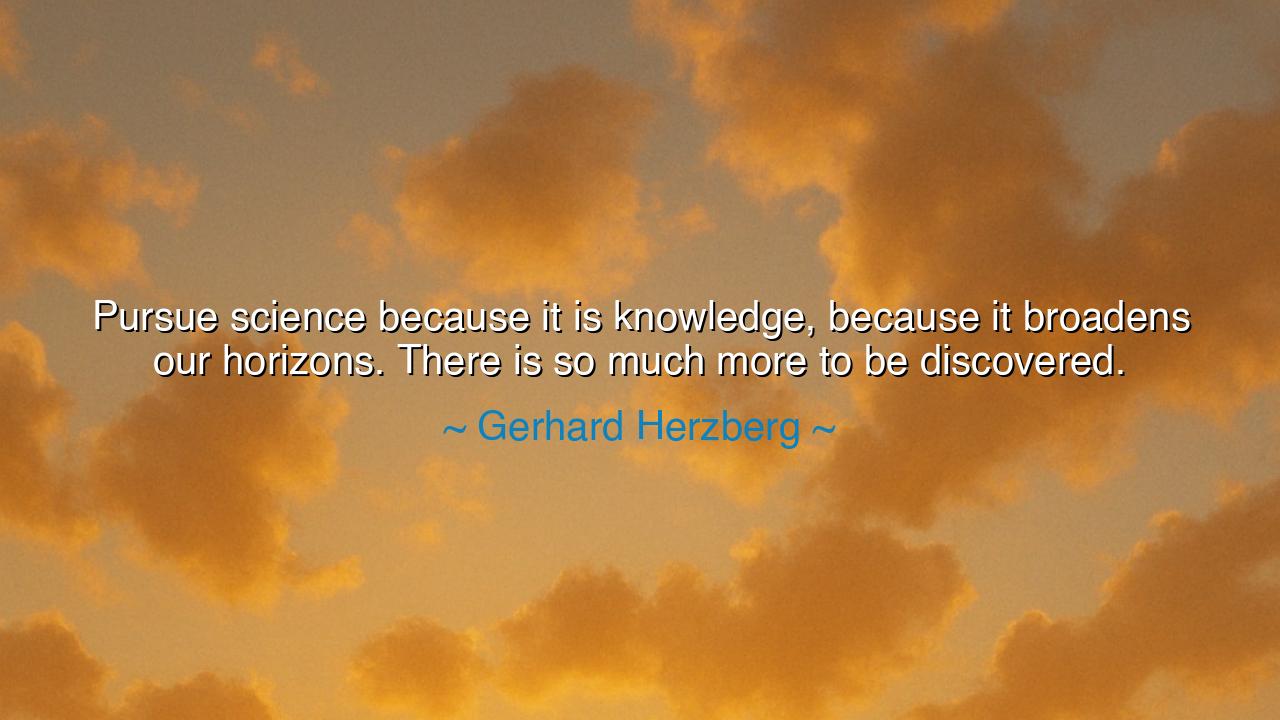
Pursue science because it is knowledge, because it broadens our
Pursue science because it is knowledge, because it broadens our horizons. There is so much more to be discovered.






When Gerhard Herzberg, the Nobel laureate and master of molecular spectroscopy, declared, “Pursue science because it is knowledge, because it broadens our horizons. There is so much more to be discovered,” he was not merely addressing the scientist — he was addressing the seeker, the dreamer, and the child of curiosity in every human being. His words are not confined to laboratories or equations; they echo across the ages as a call to the spirit of exploration itself. In this brief yet profound statement, Herzberg captures the ancient covenant between humankind and the unknown — the sacred duty to seek truth, not for wealth or fame, but for the sheer beauty of understanding.
The origin of this quote is rooted in the life of Herzberg himself, a man who fled tyranny to preserve the freedom of thought. Born in Germany, he escaped the shadow of Nazi oppression and found refuge in Canada, where he devoted his life to studying the structure of atoms and molecules. His discoveries opened new paths in quantum chemistry and astrophysics, unveiling the secrets of the stars and the unseen order of the universe. Yet, even after earning the highest honors, Herzberg remained humble, ever aware of the vastness that lay beyond his reach. To him, science was not conquest, but pilgrimage — a lifelong journey toward understanding the language written into the fabric of creation.
When he says, “Pursue science because it is knowledge,” he is invoking a truth older than civilization itself: that knowledge is sacred. In the ancient temples of Egypt and Greece, in the libraries of Alexandria and Baghdad, knowledge was revered as the bridge between mortals and the divine. Herzberg’s words remind us that to seek knowledge is to honor our humanity — for we are the only creatures who look upon the stars and ask why. The pursuit of science is, therefore, not merely practical; it is spiritual. It is the expression of our longing to understand the infinite, to glimpse the mind of creation itself.
His declaration that science “broadens our horizons” speaks to the transformative power of discovery. Every great scientific revelation — from Copernicus placing the sun at the center of the cosmos to Einstein bending space and time — has forced humanity to rethink its place in the universe. These discoveries did not simply expand our knowledge; they expanded our imagination, stretching the boundaries of what we believed possible. Herzberg knew that science liberates the human mind from the prison of ignorance. It shows us that the universe is not small, nor are we; it invites us to look beyond fear, beyond comfort, into the boundless mystery that surrounds us.
When he adds, “There is so much more to be discovered,” his tone is both humble and heroic. Even at the height of his career, after a lifetime of discovery, Herzberg stood in awe of what remained unknown. In his humility lies wisdom: that the universe is endless, and that every answer births new questions. This spirit of wonder links him to the ancient philosophers, to those who stood before the sea or the stars and felt both their own insignificance and their infinite potential. The true scientist, like the true sage, knows that learning is not a destination but a devotion — a vow to keep seeking as long as there is breath in the body and mystery in the world.
History is filled with examples that affirm his words. Think of Marie Curie, who pursued her research through poverty and illness, driven not by reward but by the desire to know. Her discoveries in radioactivity transformed science and medicine, but they also revealed her deeper truth — that knowledge, even when dangerous, is worth the price of pursuit. Or think of Galileo, who, under threat of death, refused to deny what his telescope had shown him: that the Earth moves. These were not acts of rebellion alone; they were acts of faith in reason, affirmations of humanity’s right to see farther, to know more, to lift the veil of darkness one layer at a time.
The lesson of Herzberg’s words is clear: pursue knowledge for its own sake, not for recognition, not for wealth, but for the joy of discovery. Let curiosity be your compass. Do not shrink before mystery, for mystery is the birthplace of wisdom. Read, question, experiment, observe — not because the world demands it, but because your soul does. Every person, whether scientist or artist, scholar or laborer, participates in the grand act of learning; each insight adds a thread to the tapestry of human understanding.
So let his words be a light to future generations: never believe the book of knowledge is finished. The universe still whispers secrets to those who listen, still hides treasures for those who dare to look. Pursue science, pursue truth, pursue wonder — for in doing so, you honor the essence of what it means to be human. The horizon is vast, the journey eternal, and the call — to learn, to seek, to discover — will echo through time as long as there are minds willing to answer it.






AAdministratorAdministrator
Welcome, honored guests. Please leave a comment, we will respond soon